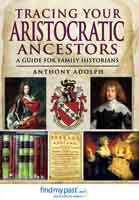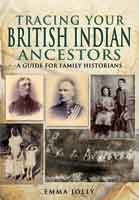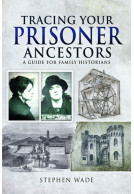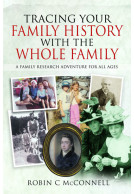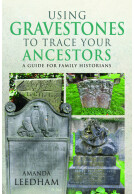Tracing Your Pre-Victorian Ancestors (Paperback)
A Guide to Research Methods for Family Historians
Imprint: Pen & Sword Family History
Series: Tracing Your Ancestors
Pages: 214
Illustrations: 30
ISBN: 9781473880658
Published: 13th February 2017
(click here for international delivery rates)
Order within the next 8 hours, 52 minutes to get your order processed the next working day!
Need a currency converter? Check XE.com for live rates
| Other formats available | Price |
|---|---|
| Tracing Your Pre-Victorian Ancestors ePub (3.4 MB) Add to Basket | £6.99 |
Tracing Your Pre-Victorian Ancestors is the ideal handbook for family historians whose research has reached back to the early nineteenth century and are finding it difficult to go further. John Wintrip guides readers through all the steps they can take in order to delve even more deeply into the past.
Carrying research through to earlier periods is more challenging because church registers recorded less information than civil registration records and little census data is available. Researchers often encounter obstacles they don't know how to overcome. But, as this book demonstrates, greater understanding of the sources and the specific records within them, along with a wider knowledge of the historical context, often allows progress to be made.
Most important, John Wintrip concentrates on how to do the research on the practical steps that can be taken in order to break through these barriers. He looks at online services, archives and their catalogues, factors that can influence the outcome of research, wider family relationships, missing ancestors and mistaken identity.
Throughout the book he emphasizes the process of research and the variety of resources and search tools that can be used.
As featured in
Who Do You Think You Are
Emerald Insight
A summary of important principles, including evidence interpretation and evaluation and common errors, plus information on the sources and techniques for research in England and Wales before the 1840s.
Essex Family Historian No.163
I have frequently read reviews describing books as 'essential' for the genealogist's bookshelf. This one truly is.
Family and Community Historical Research Society
This book is highly recommended, especially for researchers wanting a thorough framework by which to do their English research, or those North American researchers wanting to better understand how English research processes are different.
Federation of Genealogical Societies
Throughout the book, short examples and case studies illustrate well-research problems that do occur and how to overcome them through expansion of one’s knowledge of the records themselves, their history, and external knowledge that puts the results into context. Success also requires a careful research process that can be followed, and this is well illustrated through decision (Venn) diagrams.
Paul Milner Genealogy
This book is highly recommended, especially for researchers wanting a thorough framework by which to do their English research, or those North American researchers wanting to better understand how English research processes are different.
Read the complete review here.
Tracing Your Pre-Victorian Ancestors is the ideal handbook for family historians whose research has reached back to the early nineteenth century and are finding it difficult to go further. John Wintrip guides readers through all the steps they can take in order to delve even more deeply in to the past.
Kent Family History Society Journal Vol. 15 No.4
This new book concentrates on the ‘how’ of genealogical research rather than just quoting the sources that are available i.e. the actual processes involved with tackling the tracing of a family. This book is for the researcher of families in England prior to civil registration when searching can become more difficult. Since the turn of the century much more information is available online, but, the embracing of a record as ‘yours’ because it is the only likely one you can find without rigorously testing all available avenues of research is risky. Sources for Pre-1837 research are more limited, primarily parish and church registers, which vary considerably in detail included, so the solving of genealogical problems requires additional information from different sources such as Wills, parish records, monumental inscriptions, Settlements and Manorial and Court records.
Federation of Family History Societies
The Chapters are clear and well thought out including valuable sections on the challenges of pre-Victorian research, Religion and Occupation, Relocation and plenty of practical advice on searching for information in archives and libraries, family reconstitution and the Evidence and Proof needed to definitively ‘prove’ your descent. This book emphasises the skills of searching, knowledge of sources, analytical problem solving and external knowledge of localities that are employed by professional genealogists on a day to day basis. These tips can be employed by any serious family historian. Each section has relevant case studies, examples and excellent illustrations with a good bibliography and index. An excellent book, written by someone who knows what he is talking about, and one that I would recommend for any aspiring professional.
As featured in
Glasgow & West of Scotland FHS
This is an ideal handbook for those whose research has started to falter at the early 19th century. The author outlines steps that can be taken to go back further in time when research is often more complex and challenging.
B&A FHS Journal No. 168
It is possible, on Ancestry.co.uk, to reach back into the 18th century - we've done it with our own research and now, armed with this superb new title, we can make a more comprehensive job of it when we resume our efforts. Absolutely priceless and essential reading for amateur and professional genealogists alike.
Books Monthly, April 2017 – reviewed by Paul Norman
We need more of this in the UK: Sound advice on how to conduct proper, good quality genealogical research.
Karen Cummings, Professional Family History
John starts by considering the skills and knowledge needed for genealogical research and breaks this down into four areas:
knowledge of sources
searching skills
analytical and problem solving skills
external knowledge
There are chapters on sources, distinguishing between original and derivative sources and records, and search techniques, including how to get the best from online databases.
Special consideration is given to names, social status, religion, occupations and migration and how these may affect your research journey but there is much focus on methodology: using archives, evidence and proof and techniques such as family reconstitution.
John’s book describes research techniques as used by the professionals and those who take their family history seriously. It introduces the concept of considering the records you are using in the context of what was happening from a historical perspective at the time. Filled with useful case studies from his own research John teaches you to consider the wider picture.
Read the complete review here.
'A thoroughly interesting read! This is an essential book for both the professional genealogist and amateur alike. It is written in a straightforward, readable style and the author clearly has an excellent knowledge and understanding of the subject matter with the emphasis being placed on how to carry out the research.'
Jacky Casson, Professional Genealogist, Footprints in Time
'The price of £14.99 is well worth paying considering the valuable information contained within – lots of reminders for more experienced researchers and sound advice for those less so. Highly recommended!'
'Meet The Author' feature & review.
Your Family History, April 2017
This intelligent book does explore many of the pre-Victorian records available, of course, but its key premise - a valuable one - is to teach a thorough methodology to one's research. Many of the perceived problems one might face can be solved by understanding how and why records were complied, and thinking through ones research path carefully. There is excellent advice on here on what constitutes 'proof' and 'evidence'
Read it for: An excellent handbook for good practice in pre-Victorian research
What do you do when your research has got back as far as 1837? Screech to a halt? Make a new master plan? Research in England and Wales can be more challenging pre-July 1837. Birth, marriage and death certificates are no longer available with all the personal information they offer; added to which the lack of surviving national census returns makes it harder to find a person's place of birth.
WDYTYA? Magazine, May 2017 - reviewed by Pam Ross
Searching backwards from the point requires a completely different approach to get at the information. John Wintrip's book aims to make you consider very carefully what you're going to do next and plan your next move in the knowledge of all the possible alternatives both online and offline.
The book isn't aimed at beginners; it's not a step by step 'how to' book, more a 'how to think about it' book. Densely written in places, particularly in the first chapter's listing of the potential challenges, it really comes alive when he describes searches he has completed or demonstrates a point through a case study. He's very good on the perils of using transcripts and indexes, and there are useful chapters on names and social status. He stresses the importance of knowing the wider historical context while also enjoying simply browsing through parish registers for local information.
John Wintrip's experience as a librarian shows in his detailed analysis of the various types of archival catalogue, both online and in local archives. You might have to do a bit more leg-work to explore pre-Victorian records but there's a lot of information to be found if you know how to search - and this book should help you to do just that.
Among the strengths of the guide is its focus on methods as well as sources. It does not simply present a list of specific records, but instead focuses on understanding sources better in order to use them correctly. Throughout, Wintrip emphasises historical context and its importance in family history research of all forms. I also liked the way he identifies why a search may have failed, using case studies, and his explanations on how to improve search methods, indicating practical steps with online services, archives and their catalogues.
Emma Jolly, Genealogic
Overall, I am pleased to welcome this book to my family history shelves. Even the most experienced genealogist should agree that in his new work, Wintrip proffers valuable advice for all of us in breaking down our pre-Victorian brick walls.
Read the full review here.
I found this book to be an invaluable source of information for looking for my family History in England. I am in the process of searching several of my family lines. One in particular had me stumped at 1839 for a long time. I was able to find several leads as soon as I read this.
Goodreads, Michelle McMenamin
The writing is very clear and it is a very useful guide in approaching family history. There is extra care given in many of the chapters to finding the correct ancestor or proof. Many examples are used to make sure the researcher is as accurate as possible. There is also a lot of time spent going over terminology and types of records. This was very helpful. I have relied heavily on LDS for a lot of my searches. Wintrip goes in detail about possible missteps and solutions when using this search as well as some of the others.
Tracing Your Pre-Victorian Ancestors is a great book regardless of the fact of your looking for family members or not. Surname evolution and naming patterns in Chapter 4 and social status in chapter 5 was particularly interesting and helpful for me. If you love history and details of society, such as social class or record keeping, this is for you.
Well, I'm jolly glad I made the time to read his book! It's absolutely crammed with useful information, as well as hints and tips to help those of us who don't have John's experience as a professional genealogist. I found out quite a few things that I didn't know before, and more importantly the book provided confirmation of numerous assumptions I'd made in the past, but hadn't been able to back up with hard evidence (despite having a bookcase full of genealogy books)...
Lost Cousins
Tracing Your Pre-Victorian Ancestors deserves a place on the bookshelves of anyone who is, or aspires to be, a serious family historian. It's bang up to date - the GRO's new online indexes, which were launched in November are mentioned - and whilst the examples are all from England, most of the principles can also be applied to research in other English-speaking countries.
Read the full review here.
I have been greatly stimulated in reading this book as it has reminded me of facts that I had learnt and long since forgotten; taught me new ones; and made me think about the sources and the specific records that I may use when tracing my pre-Victorian ancestors. With a wider knowledge of the historical context, a researcher can often make progress in finding their ancestors. John Wintrip focuses on how to do the research and also gives his readers some of the practical steps that can help them to break down their brick walls.
The Nosey Genealogist's: Help Me With My Family Tree
Read the full review here.
Part of 'further reading' in Q&A advice column
Family Tree, March 2017
About John Wintrip
John Wintrip became a professional genealogist following an earlier career as a science librarian in universities. He was awarded a Diploma in Genealogy by the Institute of Heraldic and Genealogical Studies (IHGS) in 2008, has been a member of AGRA since 2009, and has carried out research for many clients both in the UK and overseas.










